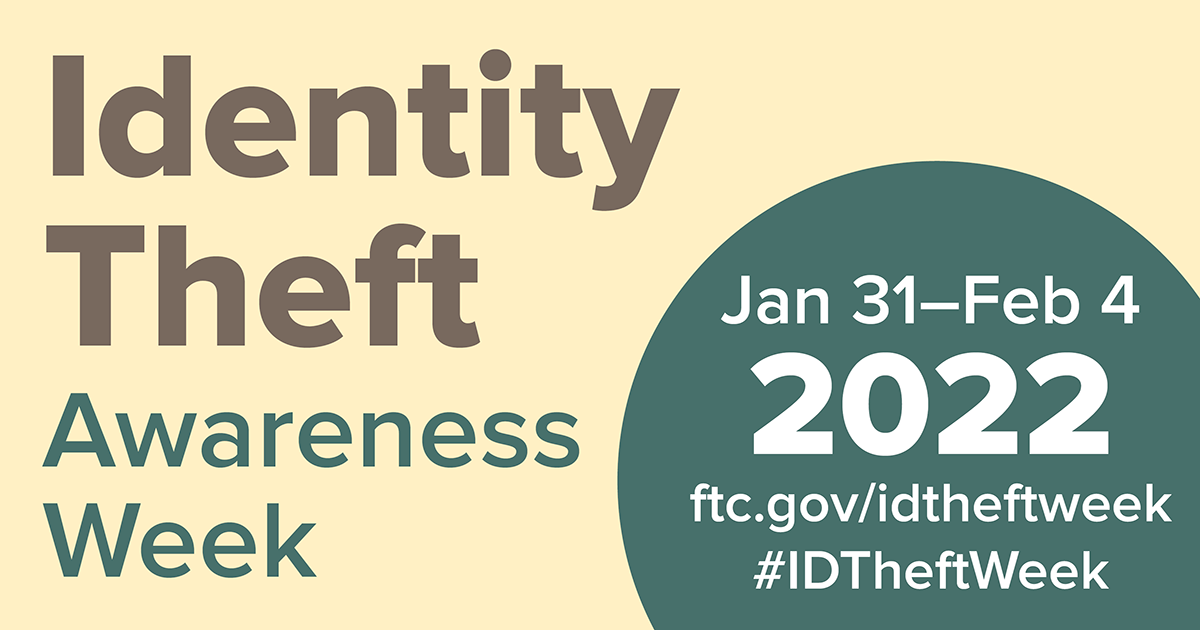 Today we’re kicking off Identity Theft Awareness Week 2022. Identity thieves have been busier than ever during the pandemic, with scammers and identity thieves after people’s information to apply for credit, unemployment benefits, file taxes, buy things, or get medical services. But there are some things you can do to protect yourself, and this week, you’ll learn how.
Today we’re kicking off Identity Theft Awareness Week 2022. Identity thieves have been busier than ever during the pandemic, with scammers and identity thieves after people’s information to apply for credit, unemployment benefits, file taxes, buy things, or get medical services. But there are some things you can do to protect yourself, and this week, you’ll learn how.
Each day this week, we’ll cover topics from the steps you can take to protect your personal information, to what to know about credit freezes and fraud alerts. Follow along with these alerts to help keep your money and personal information safe from scammers.
But wait, there’s more! This week, tune into free webinars, podcasts, and other events to hear experts discussing how to spot, protect against, and recover from identity theft. There’s something for everyone — including some events that spotlight resources for active duty service members, veterans, and older adults.
Start by joining a Facebook Live discussion at 3 p.m. ET today: Impersonator Scams & Identity Theft. You’ll hear from experts from the FTC and AARP’s Fraud Watch Network about impersonators who pretend to be from the government or well-known businesses, how they try to steal your information, and how to spot and stop them.
For details on the week’s webinars, podcasts, and Facebook Live programs, as well as how to participate, visit Identity Theft Awareness Week 2022. Then join us on Friday, when we’ll wrap up with a Twitter chat discussing identity theft trends, advice on spotting and avoiding identity theft, and how to recover.
Learn more about identity theft at ftc.gov/idtheft. And, if identity theft happens to you or someone you know, visit IdentityTheft.gov to report it and get a personalized recovery plan.

It is your choice whether to submit a comment. If you do, you must create a user name, or we will not post your comment. The Federal Trade Commission Act authorizes this information collection for purposes of managing online comments. Comments and user names are part of the Federal Trade Commission’s (FTC) public records system, and user names also are part of the FTC’s computer user records system. We may routinely use these records as described in the FTC’s Privacy Act system notices. For more information on how the FTC handles information that we collect, please read our privacy policy.
The purpose of this blog and its comments section is to inform readers about Federal Trade Commission activity, and share information to help them avoid, report, and recover from fraud, scams, and bad business practices. Your thoughts, ideas, and concerns are welcome, and we encourage comments. But keep in mind, this is a moderated blog. We review all comments before they are posted, and we won’t post comments that don’t comply with our commenting policy. We expect commenters to treat each other and the blog writers with respect.
We don't edit comments to remove objectionable content, so please ensure that your comment contains none of the above. The comments posted on this blog become part of the public domain. To protect your privacy and the privacy of other people, please do not include personal information. Opinions in comments that appear in this blog belong to the individuals who expressed them. They do not belong to or represent views of the Federal Trade Commission.
In reply to This sounds very helpful but by Mama Jo
In reply to This sounds very helpful but by Mama Jo
In reply to This sounds very helpful but by Mama Jo
In reply to I agree with Mama Jo. This by Birdie
Learn more about identity theft at ftc.gov/idtheft.
In reply to This sounds very helpful but by Mama Jo
In reply to While I recognize the FTC by Patriot 101
You can learn about FTC activity by signing up for press releases, or going to this list of Consumer Finance topics, which links to current cases and press releases about FTC activity. For example, you can read about enforcement of the Do Not Call Registry, cases related to robocalls, or privacy and security enforcement.
In reply to FTC should more rigorously by hkl
This December 2021 FTC press release explains that MyLife.com, Inc. and its CEO, Jeffrey Tinsley, have been banned from engaging in deceptive negative option marketing and will pay $21 million following allegations that they tricked consumers with “teaser background reports” and trapped them in difficult-to-cancel subscription programs.
In reply to Thanks for the info. It will by Nola knows
You can learn more about identity theft at ftc.gov/idtheft.
In reply to Neither my wife or I have a by Joe
You can learn more about identity theft at ftc.gov/idtheft.
In reply to I agree with Mama Jo. There's by Granny Lee
You can learn more about identity theft at ftc.gov/idtheft.